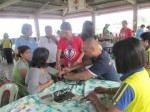After a 15-hour trip with some turbulence from a passing typhoon, Christi-Lynn del Rosario was overcome with emotion when her plane finally touched ground in the Philippines.
Rosario, a third-year molecular, cellular, and developmental biology student, landed in Manila, the capital city of the Philippines. Soon after, she hopped on another plane to a small province in the country to provide medical aid for more than 300 people.
She and the four other UCLA students who made the trip are members of the group Pilipinos for Community Health, a UCLA student group founded in 1989 that provides health care services including blood pressure screenings to communities in need locally and now, internationally.
The group has sent medical supplies to the Philippines in the past but this was their first experience traveling overseas and interacting with the patients themselves.
After a day of travelling, the group arrived in Antique, which is located on the island of Panay in the Philippines, as part of their four-day trip.
There, one doctor cares for about 32,000 citizens, close to 30 nurses care for about 1,000 patients each, and about 5,000 people don’t have a nurse to see, a nurse from Antique told Aldrich Albano, a member of the group, who went on the trip.
The group chose Antique because it is a place where quality medical treatment is hard to come by, del Rosario said.
Students, doctors, nurses and midwives set up a medical station in the town center for the day that the group was in Antique, where patients could get free health care, said Victoria Mercado, a fourth-year biochemistry student who went on the trip.
Del Rosario described the town as cluttered. Roads were unpaved and the houses were deteriorated. Many people made their living running shack-like stores in the central market, she said.
While the patients met with midwives, the UCLA students, who were certified, would also give the patients blood pressure screenings and ask them questions before their consultation with a doctor.
“A lot of (people) had questions and concerns about their body,” said Albano, a fifth-year biochemistry student. “Some had bumps, some had a hard time breathing, and some of them had rapid heart beats because of high blood pressure.”
The patients were then directed to doctors for a free full medical consultation, where they would receive medical supplies they needed such as antibiotics, vitamins or first-aid materials, Mercado said.
To purchase the medical supplies for the trip, the group held a medical outreach banquet last year in the spring that raised about $1,000, Mercado said.
The group also started having boba and bake sales to raise money for the medical supplies in the fall, she added.
After this year’s trip the group plans to make the mission an annual event.
Ingrid Biso, co-director for medical outreach for Pilipinos for Community Health and a fourth-year biology student, said the members plan to institutionalize the trip within the group and are making plans to return to the Philippines next year.
“It’s not just a quick fix. It’s only short-term therapy and we want to be able to provide sustainable medical care, and have a more positive impact (on the communities),” she said.
